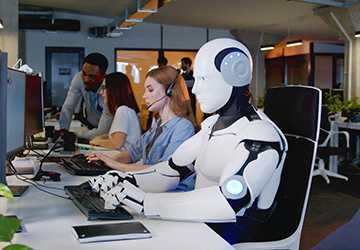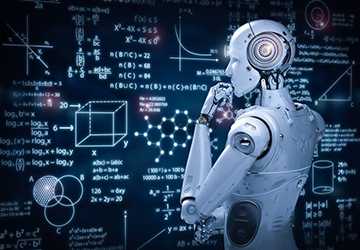The Future of Work How Technology Is Shaping Careers
As technology evolves at an unprecedented rate, its influence on the labour market and career trajectories becomes increasingly consequential. Technology's impact on jobs is profound and transformative, from automation to artificial intelligence. This article delves into the multifaceted effects of this impact, the emerging trends in future careers, and strategies for individuals to adapt to tech in the workplace and flourish in this evolving milieu.

The Technology Impact on Jobs
Automation and Job Displacement
A pivotal aspect of the technology's impact on jobs is the advent of automation. Machines and software now undertake tasks traditionally performed by humans, resulting in job displacement across various sectors. However, this transformation also unveils new opportunities for those capable of adapting and reskilling.
The Ascendancy of AI and Machine Learning
Artificial intelligence and machine learning spearhead technological progress. These innovations are revolutionizing industries such as healthcare, finance, and manufacturing. Technology's impact on jobs in these domains includes creating novel roles requiring specialized AI and machine learning competencies.
Remote Work and Digital Nomadism
The COVID-19 pandemic expedited the adoption of remote work, illuminating another facet of the technology's impact on jobs. With advancements in communication tools and collaboration platforms, an increasing number of individuals can work from anywhere globally, giving rise to digital nomadism.
Future Career Trends
Emerging Industries
As technology relentlessly advances, new industries emerge. Sectors such as renewable energy, biotechnology, and cybersecurity are significantly expanding. Acquaintance with these future career trends can equip individuals to prepare for forthcoming job opportunities.
Gig Economy and Freelancing
The gig economy is burgeoning, offering more flexible work arrangements. Digital platforms that connect freelancers with clients worldwide are propelling this trend. Those who remain ahead of future career trends can capitalize on these opportunities.
Skills and Education
The skills requisite in the contemporary job market are in perpetual flux. Staying informed about future career trends necessitates continuously updating one’s skills and education. Online courses, certifications, and training programs are becoming indispensable for career advancement.
Adapting to Tech in the Workplace
Lifelong Learning
Adapting to tech in the workplace mandates a commitment to lifelong learning. The swift pace of technological change means that skills can swiftly become obsolete. Embracing a mindset of perpetual improvement is pivotal for success.
Embracing Change
Resistance to change can impede career advancement. To thrive in a tech-driven milieu, embracing change and being receptive to new working methodologies is essential. This includes adopting new tools and technologies that can enhance productivity and efficiency.
Collaboration and Communication
Effective collaboration and communication are fundamental components of adapting to tech in the workplace. Leveraging digital tools for teamwork and maintaining clear communication channels can yield superior outcomes and more cohesive work environments.
Work-Life Balance
While technology offers numerous benefits, it is also imperative to maintain a healthy work-life balance. Adapting to tech in the workplace entails setting boundaries and managing time effectively to avert burnout and ensure long-term well-being.
Impact of Robotics on Employment
Robotics in Manufacturing
Robotics is profoundly influencing the impact of technology on jobs, especially in manufacturing. Sophisticated automata can execute intricate tasks with unparalleled precision, diminishing the necessity of human intervention. This paradigm shift necessitates a workforce adept at managing and maintaining these robotic systems, engendering new occupational roles that were previously non-existent.
Service Industry Automation
The service industry is also experiencing the impact of technology on jobs through the assimilation of robotics. From automated checkouts to robotic culinarians, the service sector is undergoing a metamorphosis that mandates novel skills and erudition from its workforce.
Robotics in Healthcare
In healthcare, robotics is revolutionizing patient care and surgical procedures. Technology's impact on jobs in this domain includes the necessity for adept technicians and engineers who can design, operate, and maintain medical robots and healthcare professionals who can synergistically collaborate with these machines.
Blockchain Technology and Career Opportunities
Financial Sector Transformation
Blockchain technology is engendering a significant technology impact on jobs within the financial sector. The decentralization and transparency proffered by blockchain catalyze the creation of novel financial products and services, necessitating a workforce proficient in blockchain technology and its myriad applications.
Supply Chain Management
Blockchain is also metamorphosing supply chain management by enhancing traceability and mitigating fraud. This technology's impact on jobs necessitates expertise in blockchain to optimize supply chain processes and ensure transactional integrity.
Cybersecurity Enhancements
As blockchain technology becomes more ubiquitous, the demand for cybersecurity experts burgeons. Comprehending the technology's impact on jobs related to blockchain includes recognizing the need for professionals who can fortify blockchain networks and prevent cyber threats.
Virtual and Augmented Reality in the Workplace
Training and Development
Virtual and augmented reality (VR/AR) engenders immersive training experiences, reflecting the technology's impact on employee development jobs. These technologies enable realistic simulations that enhance skills and safety, requiring trainers adept in VR/AR design and implementation.
Remote Collaboration
VR and AR augment remote collaboration by creating virtual workspaces where employees can interact in real time. This technology's impact on jobs encompasses roles focused on developing and managing these virtual environments to facilitate productive teamwork.
Customer Experience
In customer service, VR and AR create engaging and interactive experiences. The impact of technology on jobs here involves developing content and applications that leverage these technologies to amplify customer satisfaction and loyalty.
Artificial Intelligence in Decision-Making
Data Analysis and Insights
Artificial intelligence is revolutionizing decision-making processes by providing advanced data analysis capabilities. Technology's impact on jobs includes the necessity for data scientists and analysts who can interpret AI-generated insights to inform strategic business decisions.

Predictive Analytics
AI-driven predictive analytics are being deployed to predict trends and behaviours, affecting future career trends. Professionals with AI and machine learning expertise are in high demand to develop and apply these predictive models.
Ethical Considerations
As AI becomes more integrated into decision-making, ethical considerations proliferate. The impact of technology on jobs includes roles focused on ensuring that AI applications adhere to ethical standards and do not perpetuate biases or inequities.
Sustainability and Green Technology
Renewable Energy Careers
The transition towards renewable energy is a significant future career trend. As careers in solar, wind, and other renewable energy sources increase, specialized knowledge and skills in sustainable technologies will be required.
Environmental Impact Assessment
As industries adopt green technologies, the impact of technology on jobs includes roles in environmental impact assessment. These professionals evaluate the ecological ramifications of new technologies and ensure compliance with environmental regulations.
Sustainable Manufacturing
The move towards sustainable manufacturing practices is another future career trend; this involves developing and implementing processes that minimize waste and reduce the carbon footprint, engendering opportunities for those skilled in green manufacturing techniques.
Biotechnology and Healthcare Innovation
Genetic Engineering
Advances in biotechnology, such as genetic engineering, are engendering new future career trends in healthcare. Professionals with gene editing and biotechnology expertise are needed to develop treatments and cures for various disorders.
Personalized Medicine
The trend towards personalized medicine, where treatments are tailored to individual genetic profiles, represents a significant technological impact on jobs in the healthcare sector; this requires erudition in genomics, data analysis, and patient care.
Telemedicine
Telemedicine is expanding access to healthcare, reflecting a notable technological impact on jobs. To meet the demand for virtual care services, healthcare providers must be proficient in telehealth technologies and remote patient management.
Quantum Computing and Its Implications
Advanced Computing Roles
Quantum computing is poised to revolutionize various industries by solving complex problems beyond the capability of classical computers. This technology's impact on jobs creates demand for quantum computing experts who can develop and implement these avant-garde systems.
Cryptography and Security
Quantum computing also impacts cryptography and cybersecurity. Understanding the technology's impact on jobs in this field includes preparing for new cryptographic techniques that can withstand quantum attacks, necessitating specialized knowledge in quantum-safe encryption.
Research and Development
The ongoing research and development in quantum computing are driving new future career trends. Scientists and engineers are needed to push the boundaries of what quantum computers can achieve, opening new avenues for innovation and discovery.
Conclusion
The impact of technology on jobs is irrefutable, bringing both challenges and opportunities. By staying informed about future career trends and adapting to tech in the workplace, individuals can navigate this evolving landscape and build successful, fulfilling careers. Embracing lifelong learning, staying open to change, and leveraging technology for collaboration will be vital to thriving in the future of work.